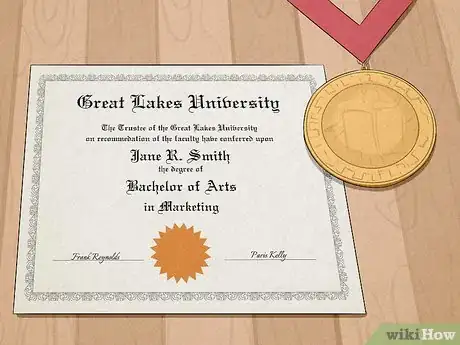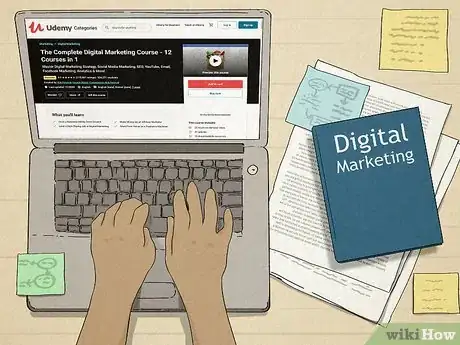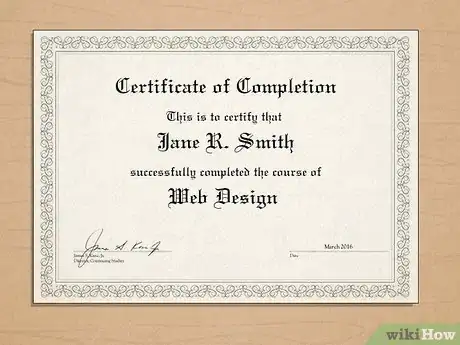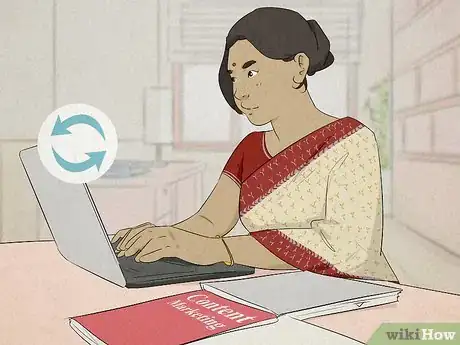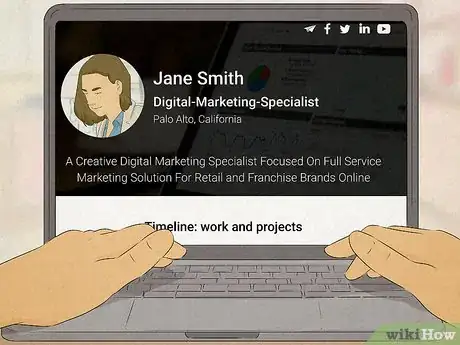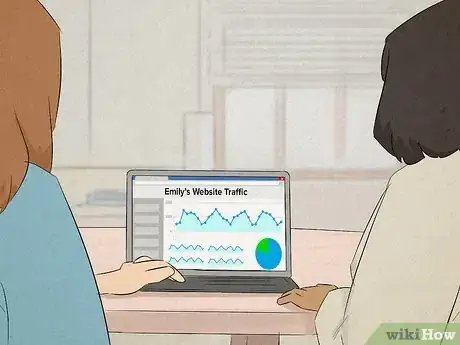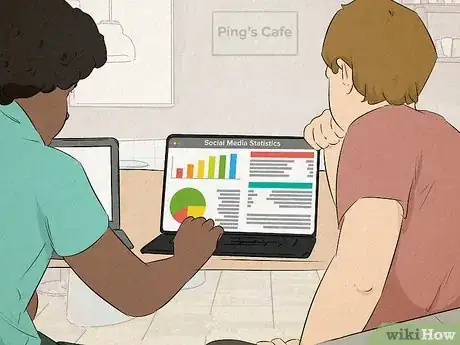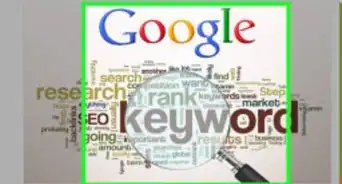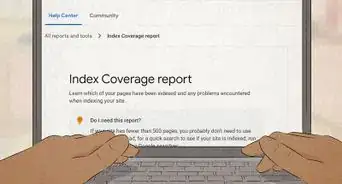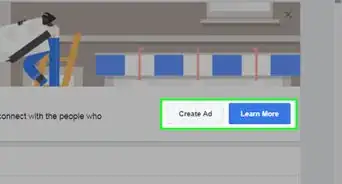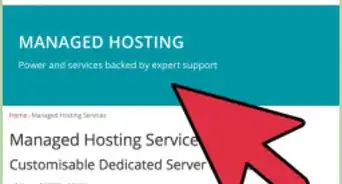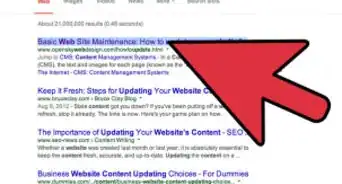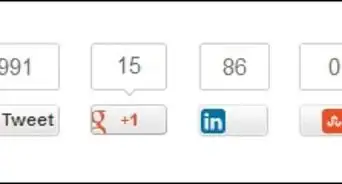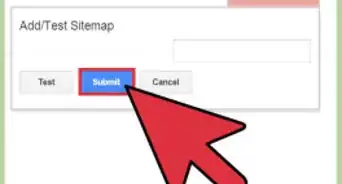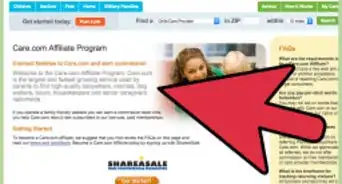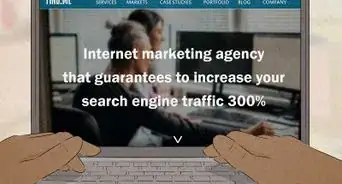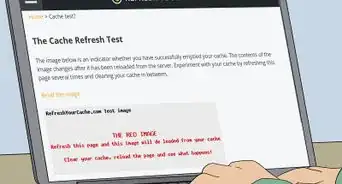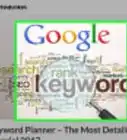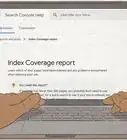This article was co-authored by Christine Michel Carter and by wikiHow staff writer, Jennifer Mueller, JD. Christine Michel Carter is a Global Marketing Expert, Best-Selling Author, and Strategy Consultant for Minority Woman Marketing, LLC. With over 13 years of experience, Christine specializes in strategic business and marketing consulting services including market analysis, organizational alignment, portfolio review, cultural accuracy, and brand and marketing review. She is also a speaker on millennial moms and black consumers. Christine holds a BS in Business Administration and Art History from Stevenson University. She is a leader in multicultural marketing strategy and has written over 100 articles views for several publications, including TIME and Forbes Women. Christine has worked with Fortune 500 clients such as Google, Walmart, and McDonald’s. She has been featured in The New York Times, BBC News, NBC, ABC, Fox, The Washington Post, Business Insider, and Today.
There are 10 references cited in this article, which can be found at the bottom of the page.
This article has been viewed 14,296 times.
Digital marketing is a fast-paced, dynamic sector with plenty of opportunities. But how do you get your foot in the door? If you have a marketing degree, that certainly helps, but not as much as showing you have the concrete skills to reach customers and sell a business's products or services. A good digital marketing specialist knows a little about many different fields, including writing, coding, graphic design, and sales psychology.[1]
Steps
Education
-
1Earn a bachelor's degree in marketing or communications. A digital marketing specialist is typically considered a management-level position that might require at least a bachelor's degree. Marketing, graphic design, web design, communications, or digital media are all good majors if you want to become a digital marketing specialist.[2]
- Some schools have degrees specifically in digital marketing.[3] However, this is hardly a requirement for digital marketing specialists. You just have to be able to prove that you have the necessary skills to do the job.
- While you're in school, take advantage of any access you might have to premium online learning tools, such as Udemy or LinkedIn Learning. You can learn skills that might not be offered as part of your regular curriculum.[4]
- If you don't have a degree in a related discipline, never fear! You can still become a digital marketing specialist, but you'll likely have to demonstrate your skills and dedication to the field.[5]
-
2Take online courses if you don't have the resources to pursue a degree. Search online for courses in social media management, SEO (search engine optimization), data analytics, content marketing, and other areas important in digital marketing. Many of these online courses are available for free and offer certificates for passage so you can prove your education to potential employers.[6]
- Some online courses do require you to pay a fee. However, these fees are often much less than you would pay for tuition to a 4-year college or university.
- In addition to your online courses, read marketing books so you have an understanding of the psychology marketers use to persuade people to buy things.[7]
Advertisement -
3Learn how to code if you're not a computer science major. Knowing how to do basic coding is not only helpful for a digital marketing specialist but also gives you knowledge many general marketers trying to transition into digital marketing won't have. You can find courses online for free that will school you in the basics. Try to nail down the nuts and bolts in the following:[8]
- HTML
- CSS
- JavaScript
- PHP
-
4Get certifications for graphic and web design programs. While you don't necessarily need any particular certifications to become a digital marketing specialist, they provide concrete proof that you know how to use a program well. A certification on your résumé is much more persuasive than simply listing that you know how to use a program.[9]
- At a minimum, get your Google Analytics certification. Data analytics is an important skill for digital marketing specialists. There are also Paid Google certifications if you're interested in doing PPC (pay-per-click) marketing.
- Most social media platforms also offer their own training programs where you can earn recognized certifications.
-
5Update your knowledge continuously to stay on top of your game. Digital marketing is a fast-changing field, so your learning never stops. Websites and blogs that focus on digital marketing news keep you informed on the latest changes that you need to adapt to.[10]
- Subscribe to leading digital marketing blogs, such as Copyblogger and Content Marketing Institute, so you're always up to date with what's happening in the industry.
- Keep abreast of changes to search engine algorithms as well (especially Google's) so you can adapt content to get the most views.[11]
- When big changes are announced, you can frequently find a lecture or workshop (either online or at a convention) that might be able to get you up to speed more efficiently than if you tried to study it on your own.
Skills
-
1Create persuasive blog posts and ad copy to hone your writing skills. Even though the internet is increasingly crowded with images and videos, text is still king. A good digital marketing specialist knows how to write a compelling piece of copy that will attract customers and sell products and services.[12]
- Copy editing and proofreading skills are also essential since you'll be doing a lot of this yourself. The most compelling copy will fail to persuade if it's riddled with typos and grammatical errors.
- If you're a good writer or editor, look for work online writing content to demonstrate your skill. You can also create your own blog on a topic of your interest to showcase your writing chops.
-
2Master basic image editing skills with graphic design software. You don't necessarily need to be a graphic designer or digital artist, but know your way around basic graphics programs, including Photoshop. As a digital marketing specialist, your employer will expect you to do basic image editing, including cropping, enhancing, or adding text to an image.[13]
- Social media posts with images tend to get more engagement than plain-text posts, so your image-editing skills will come in particularly handy if you're managing social media accounts.
- Think about how the colors you use enhance the emotion or energy in your images. Also, if sound is included, pay attention to how the tone impacts the rest of the piece.[14]
-
3Write code to practice building basic blogs and websites. For most businesses, their website is the primary way that they sell their products or services to customers. Beyond the content, a good digital marketing specialist also has enough understanding of code to place elements correctly on a web page or do some basic web design. Knowing how to code will also help you understand the layout of other websites and use this to your advantage.[15]
- Knowledge and familiarity with the basic principles of web design will help you here, even if you can't necessarily code everything. Understanding the lingo will help you communicate what you want to the web designer.
-
4Learn data analytics so you can create effective marketing strategies. Look at search engine analytics to determine what potential customers are searching for online, what content they're reading and interacting with, and how they interact online. Use this information to tweak your own content to reach your customers more effectively.[16]
- Proper use of data analytics also involves studying the analytics for your marketing content to determine what's working and what isn't. If a particular strategy isn't reaching customers, the analytics in conjunction with your knowledge of search engine algorithms can help you figure out why.
- For example, if you have marketing copy that takes 4 minutes to read, but visitors only stay on the page for an average of 1 minute, your job would be to figure out how to condense that copy so that you could get consumers the information they needed more quickly. You might also figure out how to make your copy interesting enough to keep them on the page for longer.
-
5Work with spreadsheets to budget and manage resources like a pro. If you work for one business, you could potentially have other employees that report to you. Freelance digital marketers, on the other hand, need to be able to keep multiple projects organized. While you don't necessarily have to be an expert in all the advanced spreadsheet features, knowing your way around a spreadsheet and how to create one is an essential business skill.[17]
- Creating spreadsheets for your personal life and playing around with the spreadsheet program should be good enough to get you to the level of familiarity you need. You can also take free courses online to learn how to use spreadsheet software if that's more your speed.
Experience
-
1Pursue an internship or marketing apprenticeship. Internships can be a great way to get hands-on experience in the field, especially if you're pursuing a bachelor's degree. But even if you're not attending a college or university, you can still apply for paid and unpaid internships at various companies. Just search online for programs and openings.
- If a company doesn't have an internship program, you might write them anyway and offer up your services. Let them know that you're just getting started in digital marketing and would like a little hands-on experience.
- You can also call up established marketing agencies and ask if they have an internship or apprenticeship program. If they don't, an experienced marketer might still be willing to let you shadow them for the day so you can learn a little about the business.
-
2Set up your own blog or website to test out ideas. Using your own blog or website to test different marketing techniques allow you to put different ideas into practice without risking the business of a client or employer. If you find something that works, you'll also have data to show potential employers that demonstrate the effects of your strategy in action.[18]
- Snag the URL of your name if you don't already have it and it's still available. It only costs a few bucks a year to reserve a domain name, and that property will become extremely valuable to you as you build your career and reputation.
-
3Do freelance digital marketing for local small businesses. While you're still in school or when you're just starting out, local businesses that might not have a huge marketing budget can be a great source of projects. Keep track of the effects those marketing campaigns have on the company's business and add successful projects to your portfolio.[19]
- If you can't convince small businesses to hire you, try offering your services for free. Only do this for one-off projects, so it doesn't take too much of your time. For example, you might design a website and write a little content, but you wouldn't offer to run the social media accounts for your uncle's restaurant for free.
- Take the time to research how many companies in your area could benefit from your services and would pay you for those services on an ongoing basis.[20]
-
4Manage business social media accounts for marketing experience. Leverage the social media platforms that will best reach your target market to deliver interesting, relatable content. Cultivate a rapid response time to quickly engage with customers who post comments, tag, @-mention, or message your accounts.[21]
- The 3 largest social media platforms are Facebook, Twitter, and LinkedIn. However, depending on your target market, you might get more benefit from other, smaller platforms. For example, if you're targeting consumers under 21, you might gain more ground on a platform such as TikTok.
-
5Build your own personal brand to get first-hand experience. In the ever-changing world of digital marketing, you can be your own best salesperson. If you're able to build a strong, engaged following for your own personal brand, it shows potential employers that you have the chops to build their brand as well.[22]
- Start with your username. If you have accounts on several different social media platforms, using the same screen name or username for all of them gives you brand consistency.
- Have professional photos taken to use as your icon or profile photo for each of your social media platforms. Generally, it's best to use the same photo across all platforms for brand consistency and so people will easily recognize you.
- Tweak your content to match the voice of each of the different platforms and the following you have there. For example, you might be more casual in a tweet than you would be in a post on LinkedIn.
-
6Publish an online portfolio that shows yours skills and successes. Create a page on your own website that showcases the campaigns and work you've done for clients. Include a description of each campaign that summarizes the effect your marketing campaign had on the company's business.[23]
- For example, you might mention that a targeted Facebook ad campaign increased sales of a company's product by 20%, then provide copies of the ads you created.
Expert Q&A
Did you know you can get expert answers for this article?
Unlock expert answers by supporting wikiHow
-
QuestionIs a marketing degree required for being a digital marketer?
 Christine Michel CarterChristine Michel Carter is a Global Marketing Expert, Best-Selling Author, and Strategy Consultant for Minority Woman Marketing, LLC. With over 13 years of experience, Christine specializes in strategic business and marketing consulting services including market analysis, organizational alignment, portfolio review, cultural accuracy, and brand and marketing review. She is also a speaker on millennial moms and black consumers. Christine holds a BS in Business Administration and Art History from Stevenson University. She is a leader in multicultural marketing strategy and has written over 100 articles views for several publications, including TIME and Forbes Women. Christine has worked with Fortune 500 clients such as Google, Walmart, and McDonald’s. She has been featured in The New York Times, BBC News, NBC, ABC, Fox, The Washington Post, Business Insider, and Today.
Christine Michel CarterChristine Michel Carter is a Global Marketing Expert, Best-Selling Author, and Strategy Consultant for Minority Woman Marketing, LLC. With over 13 years of experience, Christine specializes in strategic business and marketing consulting services including market analysis, organizational alignment, portfolio review, cultural accuracy, and brand and marketing review. She is also a speaker on millennial moms and black consumers. Christine holds a BS in Business Administration and Art History from Stevenson University. She is a leader in multicultural marketing strategy and has written over 100 articles views for several publications, including TIME and Forbes Women. Christine has worked with Fortune 500 clients such as Google, Walmart, and McDonald’s. She has been featured in The New York Times, BBC News, NBC, ABC, Fox, The Washington Post, Business Insider, and Today.
Global Marketing Expert
-
QuestionHow do I use Facebook for business marketing?
 Christine Michel CarterChristine Michel Carter is a Global Marketing Expert, Best-Selling Author, and Strategy Consultant for Minority Woman Marketing, LLC. With over 13 years of experience, Christine specializes in strategic business and marketing consulting services including market analysis, organizational alignment, portfolio review, cultural accuracy, and brand and marketing review. She is also a speaker on millennial moms and black consumers. Christine holds a BS in Business Administration and Art History from Stevenson University. She is a leader in multicultural marketing strategy and has written over 100 articles views for several publications, including TIME and Forbes Women. Christine has worked with Fortune 500 clients such as Google, Walmart, and McDonald’s. She has been featured in The New York Times, BBC News, NBC, ABC, Fox, The Washington Post, Business Insider, and Today.
Christine Michel CarterChristine Michel Carter is a Global Marketing Expert, Best-Selling Author, and Strategy Consultant for Minority Woman Marketing, LLC. With over 13 years of experience, Christine specializes in strategic business and marketing consulting services including market analysis, organizational alignment, portfolio review, cultural accuracy, and brand and marketing review. She is also a speaker on millennial moms and black consumers. Christine holds a BS in Business Administration and Art History from Stevenson University. She is a leader in multicultural marketing strategy and has written over 100 articles views for several publications, including TIME and Forbes Women. Christine has worked with Fortune 500 clients such as Google, Walmart, and McDonald’s. She has been featured in The New York Times, BBC News, NBC, ABC, Fox, The Washington Post, Business Insider, and Today.
Global Marketing Expert Marketers should post interesting, quality, relevant content to social media on a consistent basis. It's important to keep in mind that the majority of users on Facebook aren't looking to be sold products and services. However, it is a content marketing tool, so you can use it as an indirect way of advertising to consumers.
Marketers should post interesting, quality, relevant content to social media on a consistent basis. It's important to keep in mind that the majority of users on Facebook aren't looking to be sold products and services. However, it is a content marketing tool, so you can use it as an indirect way of advertising to consumers.
References
- ↑ https://databox.com/how-to-get-a-job-in-digital-marketing
- ↑ https://www.smudailycampus.com/sponsoredcontent/promoted/6-convincing-reasons-to-pursue-a-career-in-digital-marketing
- ↑ https://www.dctc.edu/academics/programs-majors/marketing-sales/digital-marketing-specialist/
- ↑ https://databox.com/how-to-get-a-job-in-digital-marketing
- ↑ https://www.prospects.ac.uk/job-profiles/digital-marketer
- ↑ https://www.entrepreneur.com/article/286082
- ↑ https://digitalardor.com/articles/digital-marketing-specialist-skills/
- ↑ https://digitalardor.com/articles/digital-marketing-specialist-skills/
- ↑ https://databox.com/how-to-get-a-job-in-digital-marketing
- ↑ https://databox.com/how-to-get-a-job-in-digital-marketing
- ↑ https://www.digitaldoughnut.com/articles/2018/september/10-skills-to-be-a-rockstar-in-digital-marketing
- ↑ https://www.entrepreneur.com/article/289363
- ↑ https://www.entrepreneur.com/article/289363/
- ↑ Christine Michel Carter. Global Marketing Expert. Expert Interview. 30 September 2020.
- ↑ https://www.prospects.ac.uk/job-profiles/digital-marketer
- ↑ https://www.digitaldoughnut.com/articles/2018/september/10-skills-to-be-a-rockstar-in-digital-marketing
- ↑ https://www.entrepreneur.com/article/289363
- ↑ https://digitalardor.com/articles/digital-marketing-specialist-skills/
- ↑ https://www.smudailycampus.com/sponsoredcontent/promoted/6-convincing-reasons-to-pursue-a-career-in-digital-marketing
- ↑ Christine Michel Carter. Global Marketing Expert. Expert Interview. 30 September 2020.
- ↑ https://www.digitaldoughnut.com/articles/2018/september/10-skills-to-be-a-rockstar-in-digital-marketing
- ↑ https://databox.com/how-to-get-a-job-in-digital-marketing
- ↑ https://databox.com/how-to-get-a-job-in-digital-marketing
